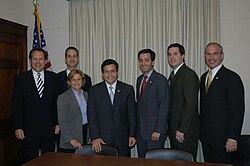Congressional Hispanic Conference
Currently with 20 members, the CHC was formed in 2003, with the stated goal of promoting policy outcomes of importance to Americans of Hispanic or Lusitanic descent.
[1] The impetus behind the Conference's creation was the debate surrounding the nomination of conservative lawyer Miguel Estrada to the DC Circuit Court of Appeals and ideological differences in the Congressional Hispanic Caucus, which was predominantly populated by Democratic members of Congress.
[2] Joined by Bonilla, Ros-Lehtinen, his brother Lincoln, and newly elected colleague Devin Nunes, a California congressman of Portuguese (Azorean) descent, Díaz-Balart decried what he perceived as Hispanic Democratic efforts to derail the nomination of Estrada, a selection seen by some at the time as a possible fast track to the U.S. Supreme Court.
Additionally, the Conference is open to non-Hispanic "associate" members who represent districts with significant Hispanic populations or generally support its goals with regards to public policy.
After the 2010 midterm elections, six new Hispanic Republicans were elected to Congress: Senator Marco Rubio of Florida, Representatives David Rivera of Florida, Raúl Labrador of Idaho, Francisco Canseco and Bill Flores of Texas, and Jaime Herrera Beutler of Washington, as well as Portuguese American Senator Pat Toomey of Pennsylvania, who was a member of the conference when he served in the House.

